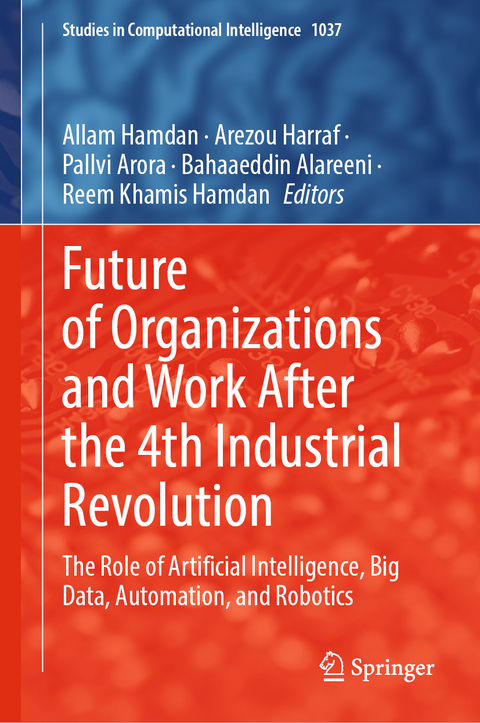
Future of Organizations and Work After the 4th Industrial Revolution
Springer International Publishing (Verlag)
978-3-030-98999-6 (ISBN)
This book takes a forward-looking approach by bringing in research and contributions that facilitate in mapping the impact of AI and big data on businesses, the nature of work along with providing practical solutions for preparing the work, workplace, and the workforce of the future.
Organizations globally have been experiencing immense transformation due to the reinvention and redefining of the business models due to the dynamic nature of the business environment. Looking at an organizational context, undeniably, the definition of 'work' and 'organizations' is genuinely changing. Artificial intelligence, big data, automation, and robotics are a few of those keywords that are seemingly entering the workplace and reshaping the way work is being done. Moreover, the transition that is being addressed herein not only focuses upon aspects that are operative within an organization like the organizational culture, team building, networking, recruitments, and so on but also aims toaddress the external aspects like supply chain management, value chain analysis, investment management, etc. Broadly, every single step that is now taken is intensely experiencing this impact upon its functioning.
This book serves as a guide not just to the academia but also to the industry to adopt suitable strategies that offer insights into global best practices as well as the innovations in the domain.
Part I: Driving Innovative and Creative Practices.- Challenges of the Industrial IOT (IIoT) in Higher Education in the Kingdom of Bahrain.- The role of Emotional Intelligence in the improvement of Industrial Multicriteria Decision Making: A Model Driven Approach for Emotional Intelligence Testing.- Redesigning and Reinvention of Retail Industry through Artificial Intelligence (AI).- The Role of Artificial intelligence in Human Resources.- Transforming into Smart Business: The role of Artificial Intelligence.- The Dynamic Capital Structure Decision of Firms in Indonesia.- The Suitability of Gold as a High-quality Liquid Asset: Empirical Evidence from Volatility Structure Analysis.- The Impact of Artificial Intelligence on the Banking Industry Performance.- Part II: Social media, Communication and its effects on society and business.- In Influencers We Trust? A Model of Trust Transfer in Social Media Influencer Marketing.- The Usage of Artificial Intelligence in Journalism.- Societal Partnership in the Fourth Era of Industrial Revolution Between the Media And Civil Society Institutions Aiming To Reducing The Demand For Drugs.- Artificial Intelligence: Chatbot - The New Generation of Communication.- The Relationship Between Food E-Advertising and Children's Obesity in Bahrain.- Technological Sustainability in the 21st Century.- Part III: The implementation of technology and the future of education and knowledge.- Interns' Self-Efficacy, Internet Addiction, Wellbeing, and Online Learning Experiences: A Descriptive-Correlational Study.- The challenges and factors influencing the E-learning system usage during COVID-19 pandemic.- Student Invigilation Detection using Deep Learning and Machine after Covid-19: A Review on Taxonomy and Future Challenges.- The Websites Technology for Arabic Language Learning through COVID-19 Pandemic.- The Impact of Digitizing Business Education on the Quality of Education during COVID-19 Pandemic: The Role of International AccreditationBodies.- The Role of Artificial Intelligence in Knowledge Management.- Knowledge and Perceptions of the COVID-19 Pandemic in the Kingdom of Bahrain: A Descriptive Study.- Part IV. The Fourth Industrial Revolution, cryptocurrency, cybersecurity, ethics and corporate performance.- Risks, Advantages and Obstacles Associated with Bitcoin: The Perspective of Palestinian Banks.- The impact of major technologies in Fourth Industrial Revolution.- The Usage of Financial Technology Payments During the Pandemic of Covid-19.- The Influence of Cybersecurity on The Firms' Financial Performance.- The Fact of corporate governance in the Palestinian territories.- Malay Ethnic Directors, Board Attributes and Ownership Structure on Firm Performance: Corporate Governance Evidence from an Emerging Market.- Impact of Derivatives on Firm Value: Evidence on Shariah and non-Shariah Compliant Firms.- The Impact of Artificial Intelligence (AI) in the Oil and Gas Industry.
| Erscheinungsdatum | 16.06.2022 |
|---|---|
| Reihe/Serie | Studies in Computational Intelligence |
| Zusatzinfo | XI, 545 p. 51 illus., 46 illus. in color. |
| Verlagsort | Cham |
| Sprache | englisch |
| Maße | 155 x 235 mm |
| Gewicht | 957 g |
| Themenwelt | Mathematik / Informatik ► Informatik ► Datenbanken |
| Informatik ► Theorie / Studium ► Künstliche Intelligenz / Robotik | |
| Technik ► Elektrotechnik / Energietechnik | |
| Schlagworte | Artificial Intelligence • Automation • Big Data • Computational Intelligence • Industry 4.0 • Robotics |
| ISBN-10 | 3-030-98999-2 / 3030989992 |
| ISBN-13 | 978-3-030-98999-6 / 9783030989996 |
| Zustand | Neuware |
| Haben Sie eine Frage zum Produkt? |
aus dem Bereich


